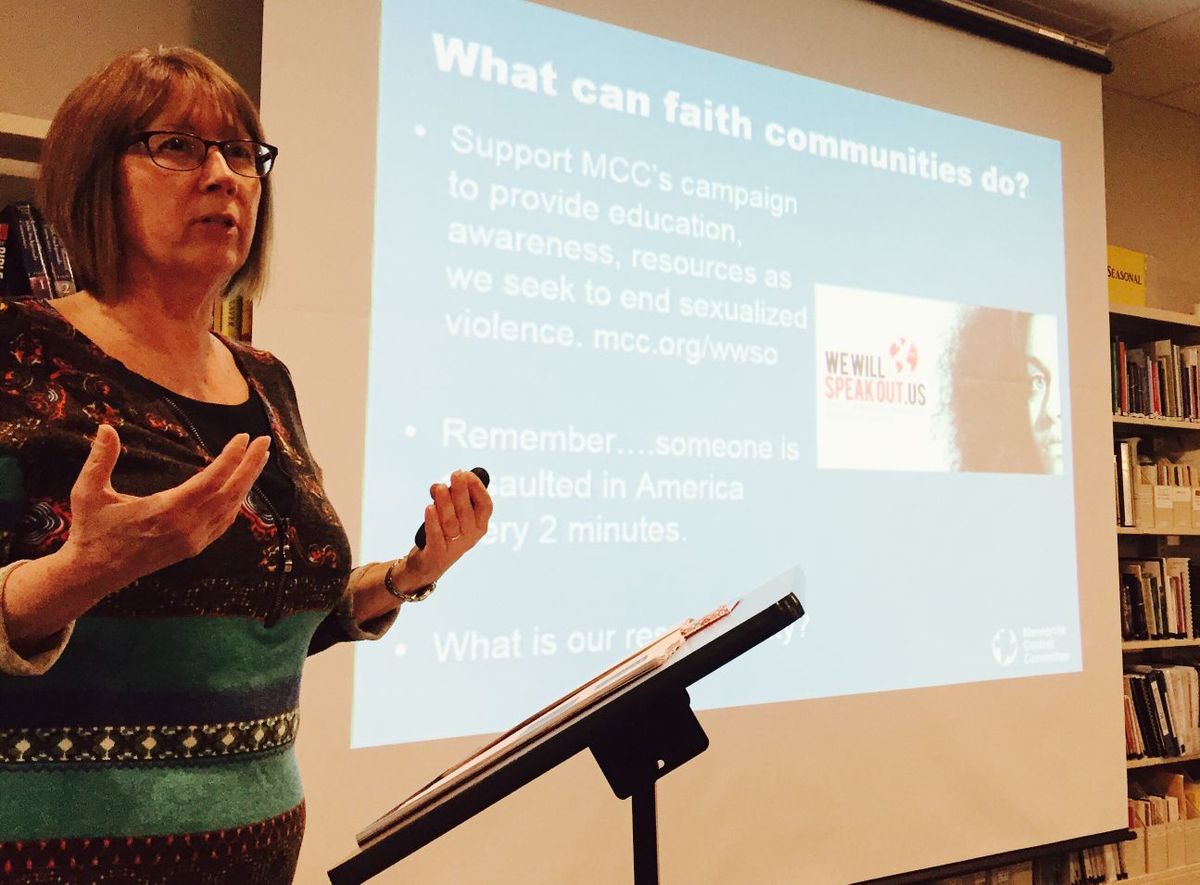Churches Come up Short When Dealing with Domestic and Sexual Abuse
By Earle Cornelius
How do churches deal with issues of domestic or sexual abuse within their congregations? “Not well,” says Lorraine Stutzman Amstutz. Amstutz is a longtime restorative justice coordinator with Mennonite Central Committee. Most of her career has been devoted to resolving issues between crime victims and offenders and helping churches in conflict. Lately, however, her work has expanded to include aiding church members who are victims of domestic and/or sexual abuse and helping churches whose members are dealing with those issues. It is part of a three-year campaign — titled “We Will Speak Out” — begun in 2015 by a movement of faith-based groups. The goal of the campaign, Amstutz explained to a gathering at the Parish Resource Center last week, is to raise awareness, care for victims, encourage law enforcement, change the culture of tolerance and inaction and ultimately provide resources to church leaders to help them support and assist those within their congregations who have been abused. Anne Winslow, 53, of Lancaster, understands what it means to be a victim. A survivor of sexual and domestic abuse, the student at Biblical Theological Seminary in Hatfield, Montgomery County, says her goal is to help people who have been victimized and to raise awareness within the church. 'Nobody wants to talk about it' Winslow works with women at one church who, she contends, have been forced to suppress their concerns because church leaders “can’t relate to them.” The church, she said, expects victims “to forgive. I don’t think (church leaders) understand that takes a long time.” And it’s not just churches that cannot relate. Winslow said seminary students also are loath to discuss sexual or domestic violence. “In class, nobody wants to talk about it,” she said. The campaign defines sexualized violence as rape, incest, human trafficking, harassment, unwanted contact and intimate partner violence. It can be physical or psychological. Statistically, someone is sexually assaulted every two minutes, according to the Rape, Abuse & Incest National Network. Amstutz acknowledged the complexity of sexual and domestic abuse. Perpetrators themselves often have been abused or mistreated and therefore need counseling. But pastors and church staffers typically have little training to address either abusers or the abused. Setting ground rules Amstutz recounted one case in which a person who had been convicted of sexual assault wanted to return to church. Allowing him to attend, she said, was a decision for church elders. But she insisted that while in church, he would have to be accompanied by another person at all times. “I’m not talking about someone being handcuffed to him,” she said. “I’m talking about having a friend.” Ultimately, the man refused to accept those ground rules and was banned from the church. “That is about accountability and keeping people safe,” she said. “For me, it’s making sure that we’re keeping our children and others safe in that congregation when we know someone has perpetrated a crime.” She acknowledged there are times when the church is at fault. Church leaders sometimes send the wrong message by suggesting that victims “move on” or forgive their abusers. But there also are occasions when church leaders are themselves abusers or fail to report abuse. That is alleged to have been the case at Grace Point Church of the Nazarene near Ephrata. Police have charged a teacher with endangering the welfare of a child for allegedly slapping a 14-month-old boy. A pastor was charged with failure to report the incident to authorities. In the Diocese of Altoona-Johnstown, three Catholic priests were charged for their failure to remove the late Stephen Baker, who is alleged to have sexually abused more than 100 children. Amstutz is working with a woman who was the victim of a sexual assault by a leader within the church. Although that individual no longer holds that post, the victim wants the church to be held accountable. And that has created a different dynamic. “One of the things that I recognized is that ... like many organizations, the church is set up to protect itself,” she said. So what can faith communities do? Many churches now require background checks for people who work with children. Amstutz said that is a first step. “It sets a standard, but it only catches those who already have been caught.” Churches can bring in facilitators to educate and train pastors and staff members to work with survivors. One survey that found more than 80 percent of pastors said they would take action to reduce sexual and domestic violence if they had the training and resources to do so. The church also can create circles of support for victims to let them know they are not alone. And people, she said, must speak out. “Bystander intervention is a superpower.” Attendee Daryl Snider offered one other option. He said it is important for people within the church to hear victims’ stories. “Unless those stories are told,” he said, “we can’t see the pain, we can’t see the harm.”
|
.
Any original material on these pages is copyright © BishopAccountability.org 2004. Reproduce freely with attribution.
